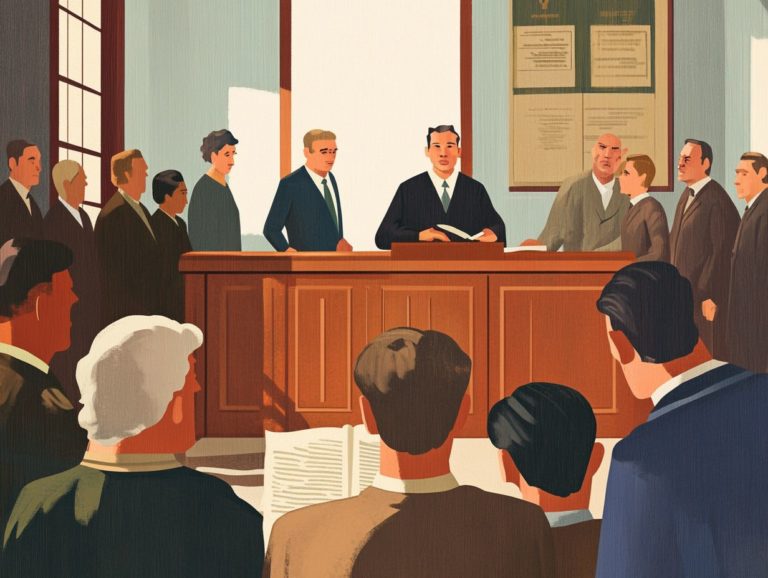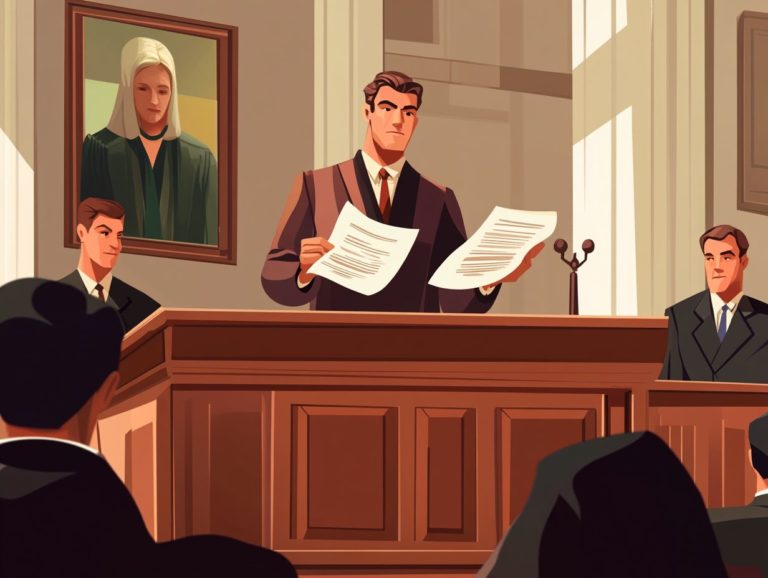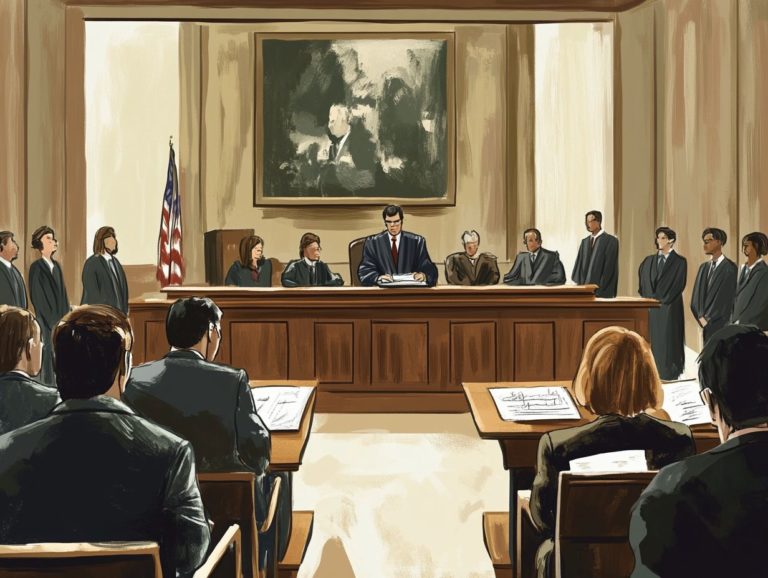The Importance of Cross-Examination in Defense
Cross-examination is a crucial aspect of your defense strategy. It acts as a powerful tool to challenge witness credibility and reshape your case narrative.
This exploration delves into the intricacies of cross-examination, starting with its definition and purpose. It will guide you through effective preparation strategies, impactful questioning techniques, and how to manage difficult witnesses while recognizing common pitfalls.
You’ll also examine the ethical standards governing this practice and their significant influence on case outcomes. By enhancing your understanding of this essential legal art, you’ll be better equipped to navigate courtroom complexities.
Contents
- Key Takeaways:
- The Role of Cross-Examination in Defense
- Preparing for Cross-Examination
- Strategies for Effective Cross-Examination
- Common Mistakes to Avoid in Cross-Examination
- The Impact of Cross-Examination on the Outcome of a Case
- The Ethics of Cross-Examination
- Frequently Asked Questions
- What is cross-examination in defense and why is it important?
- How does cross-examination benefit the defense in a legal case?
- What are some key techniques used in cross-examination by the defense?
- Can cross-examination be used for all types of witnesses in a legal case?
- What are the potential risks of cross-examination in defense?
- How can a skilled defense lawyer effectively use cross-examination to defend their client?
Key Takeaways:
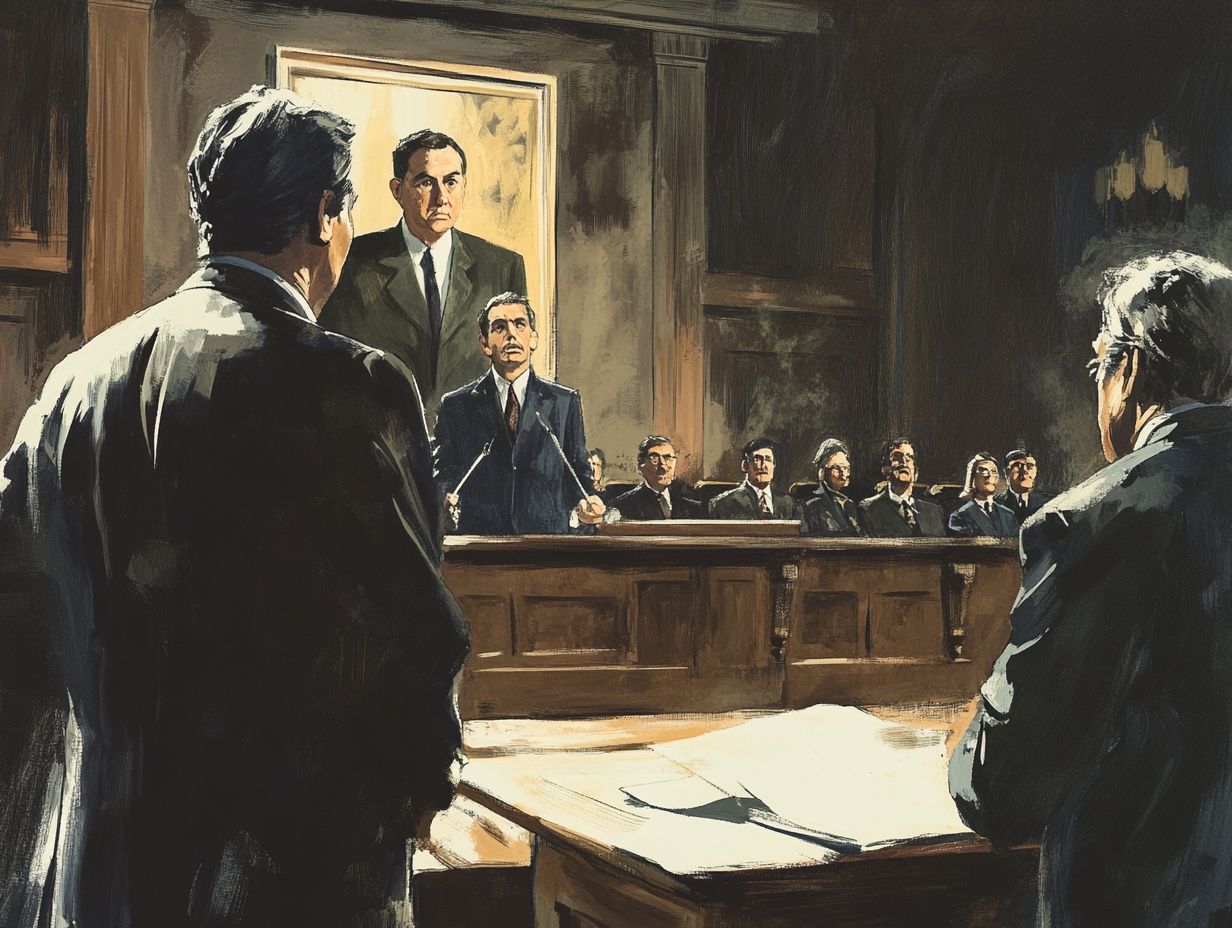
Effective cross-examination is crucial for building a strong defense case, as it allows you to challenge the credibility and consistency of witness testimonies. Understanding the right to cross-examine witnesses is essential in this process.
Preparation is key for conducting successful cross-examination. Consider factors like witness demeanor and potential responses to questions.
Avoiding common mistakes and adhering to ethical considerations in cross-examination can greatly influence case outcomes and maintain professional standards in the legal field.
The Role of Cross-Examination in Defense
Cross-examination is vital to your defense strategy in a trial. It serves as a key tool for challenging the credibility of prosecution witnesses while engaging the jury, making trial preparation an essential component of effective defense.
By utilizing structured questioning techniques, you can reveal inconsistencies in witness testimonies and effectively undermine the prosecution’s case. Careful planning and preparation are crucial in this courtroom dynamic.
As a trial lawyer, you must set clear objectives during cross-examination to ensure your courtroom presence is persuasive and impactful.
Definition and Purpose
Cross-examination allows you to question a witness after their initial direct examination. This process enables you to directly challenge their testimony and credibility.
This critical phase not only tests the reliability of what was said during direct examination but also seeks to uncover any biases, inconsistencies, or omissions that could affect the case outcome.
Effective cross-examination relies on thorough legal research and a deep understanding of your case specifics. Careful planning is essential; crafting a strategic approach that considers the witness’s background and weaknesses can lead to compelling questions.
Ultimately, this process is vital for achieving a fair hearing, ensuring that the jury or judge receives a well-rounded view of testimony truthfulness.
Preparing for Cross-Examination
Effective preparation for cross-examination is essential for you as a trial lawyer. It enhances your courtroom effectiveness and allows you to develop a well-structured legal strategy.
This careful approach can profoundly shape the jury’s perception of witness reliability.
Key Factors to Consider
When preparing for cross-examination, consider key factors such as witness reliability, questioning strategy effectiveness, and potential credibility issues.
An in-depth understanding of the witness s background is essential. This knowledge allows you to craft tailored questions that can uncover inconsistencies in their testimony.
Your questions should be succinct and pointed, designed to encourage the witness to clarify or reconsider their statements. Anticipating emotional responses and being ready to pivot based on their reactions can enhance your examination’s overall impact.
Engaging with the jury throughout this process helps frame the witness s reliability, ultimately reinforcing your position as an attorney.
Strategies for Effective Cross-Examination
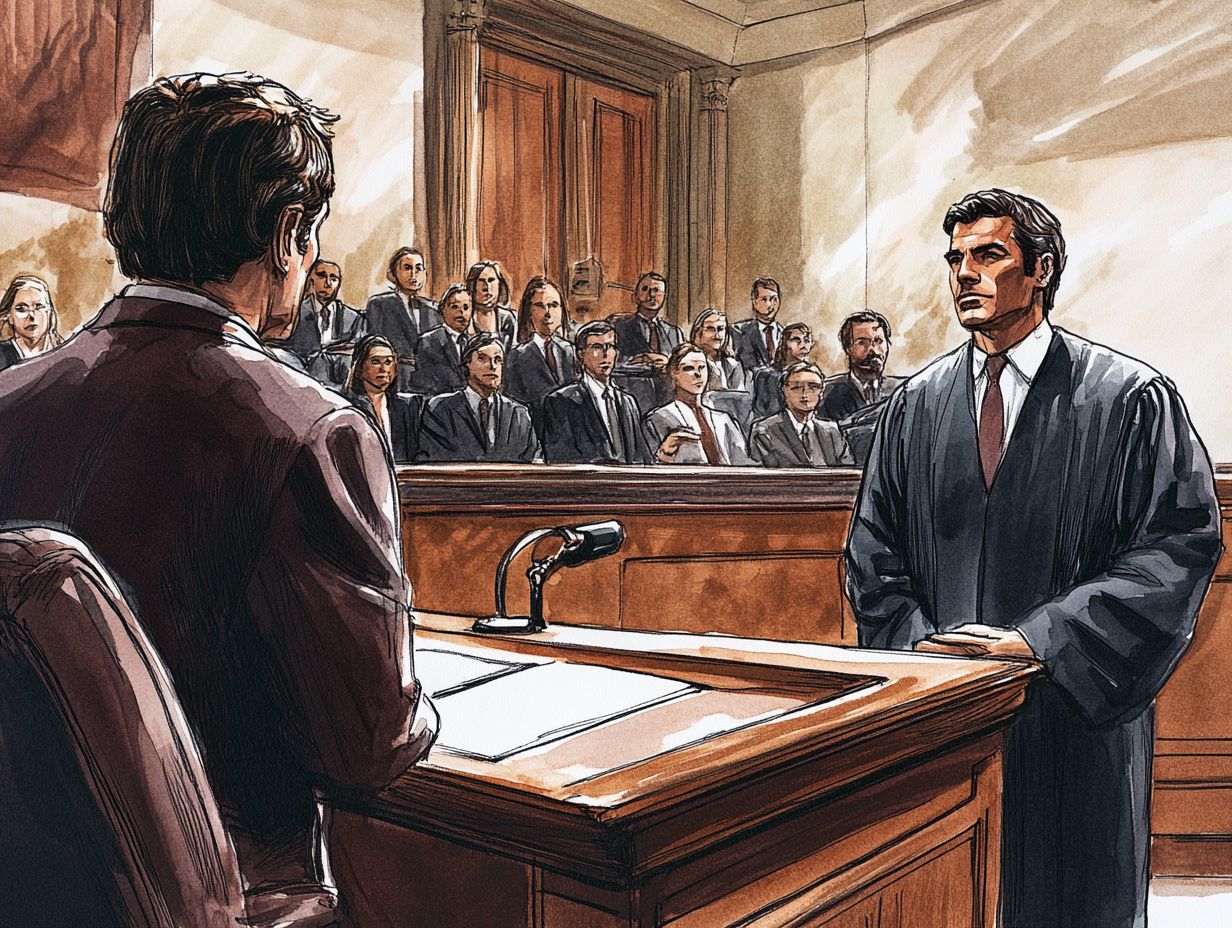
Implementing effective strategies for cross-examination is vital for you as a trial lawyer. This is your opportunity to control the narrative, engage the jury, and steer the case outcome in your favor.
Through persuasive questioning and well-timed courtroom tactics, you can significantly influence the trial’s direction.
Ready to master your cross-examination skills? Let’s dive deeper!
Questioning Techniques
Different questioning techniques can profoundly influence the outcome of cross-examination. By mastering sequential questioning and crafting articulate inquiries, you equip yourself with powerful tools to shape witness responses.
Utilizing these methods fosters a more engaging courtroom atmosphere and guides the witness toward disclosing crucial information. Sequential questioning is particularly impactful as it dismantles complex issues into manageable steps.
This approach allows you to maintain control while minimizing evasive answers. Pauses and silence can amplify tension, prompting witnesses to fill in gaps with spontaneous insights.
This psychological tactic often uncovers inconsistencies in testimonies, enhancing your cross-examination’s effectiveness and leaving a lasting impression on the jury.
Handling Difficult Witnesses
Handling difficult witnesses during cross-examination requires courtroom strategies and pointed questioning aimed at undermining testimony and exposing inconsistencies.
Your management of these witnesses hinges on meticulous preparation, allowing you to anticipate challenges and craft tailored questions.
By adapting your approach in real-time, you can adjust tactics to align with the witness’s responses. This adaptability keeps you in control and increases your chances of eliciting truthful admissions or contradictions.
Understanding a witness’s background and temperament can aid in predicting behavior. Developing a strategy that combines analytical thinking with keen observation is essential for navigating complex interactions.
Common Mistakes to Avoid in Cross-Examination
Avoiding common mistakes in cross-examination is crucial for trial lawyers. Missteps can damage credibility and undermine the accuracy of testimony.
Each question should be crafted with precision to maintain case integrity.
Pitfalls and Consequences
The pitfalls of ineffective cross-examination lead to severe consequences, impacting courtroom effectiveness and diminishing jury engagement.
Failing to connect with the jury risks losing the chance to challenge a witness’s credibility, resulting in an imbalanced presentation of evidence.
This misstep can leave jurors feeling disengaged or confused, significantly undermining your advocacy efforts.
Poorly planned or overly aggressive questioning can alienate the jury, making them less receptive to your argument.
Effective advocacy requires keeping the jury engaged, enhancing your case’s persuasive power while ensuring they focus on key issues.
The Impact of Cross-Examination on the Outcome of a Case
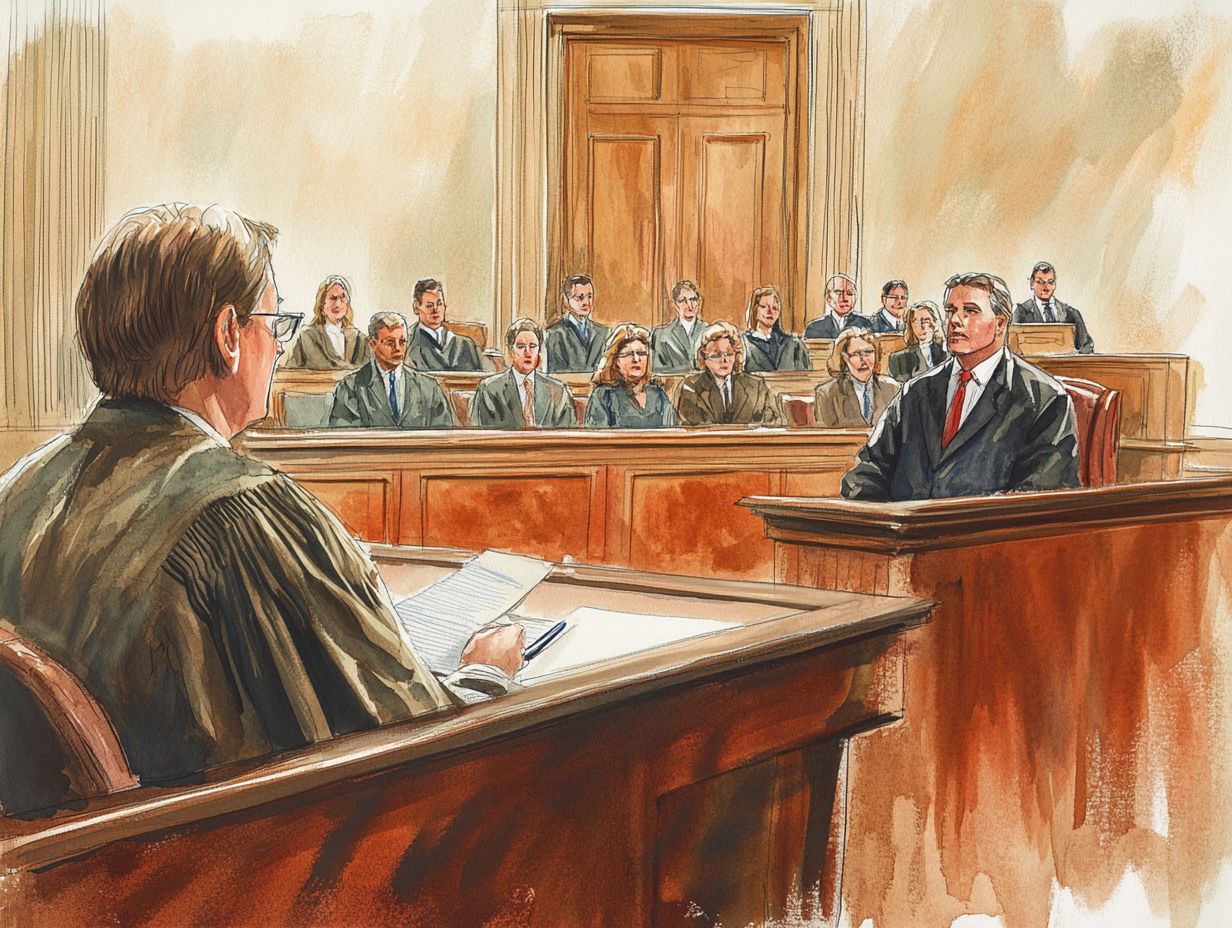
The impact of cross-examination on a case’s outcome is significant. It shapes jury perceptions and can sway results decisively.
Examples and case studies illustrate how effective cross-examination determines a trial’s direction.
Examples and Case Studies
Analyzing case studies of cross-examination reveals insightful strategies that experienced trial lawyers use to shape courtroom dynamics and influence jury decisions.
For instance, in the landmark case of Crawford v. Washington, the defense executed a compelling strategy that successfully challenged a witness’s credibility, culminating in a favorable verdict.
Similarly, during O.J. Simpson’s trial, the defense team’s meticulous dissection of forensic evidence raised substantial doubts, demonstrating how pivotal questioning can redirect jury focus.
These instances show that skilled attorneys grasp the facts and understand jurors’ psychological nuances. They employ techniques that resonate emotionally, reinforcing their case while undermining the prosecution s narrative.
The Ethics of Cross-Examination
Examining the ethics of cross-examination is vital for maintaining professional standards. It ensures integrity in the courtroom.
As a trial lawyer, you must find a balance between effective advocacy and your ethical obligations. This includes respecting both the court and witnesses.
Professional Standards and Guidelines
Adhering to professional standards and ethical guidelines is essential for you as a trial lawyer during cross-examination. This ensures that the process remains fair and upholds the integrity of the courtroom.
These standards are not just mere suggestions; they are the foundation of a just legal system. You are expected to approach cross-examination with a strong sense of responsibility, ensuring that your questioning does not manipulate or coerce witnesses in a way that could compromise the pursuit of truth.
By maintaining professionalism, you contribute to preserving the respect and trust essential for the legal process to function effectively. Your commitment to these ethical guidelines guarantees that all parties involved whether defendants, plaintiffs, or witnesses feel protected and treated with dignity, fostering an environment conducive to fair adjudication.
Frequently Asked Questions
What is cross-examination in defense and why is it important?
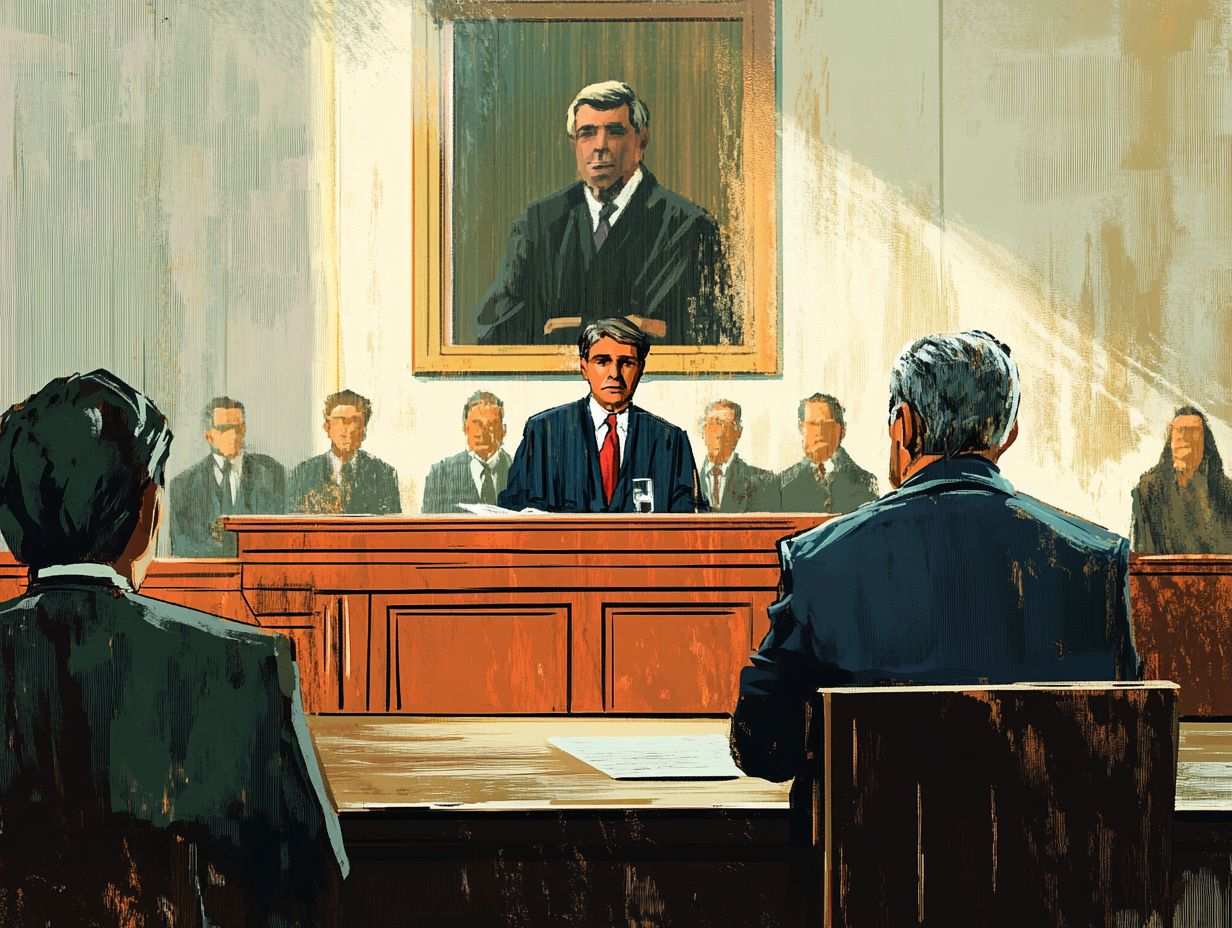
Cross-examination is when a lawyer questions a witness to find inconsistencies in their testimony. It is a crucial strategy in defending a client as it allows the defense lawyer to challenge the credibility and reliability of the witness.
How does cross-examination benefit the defense in a legal case?
Cross-examination is your chance to challenge the prosecution! It allows the defense to gather important information from the prosecution’s witness, uncover inconsistencies, and weaken the prosecution’s case. It also provides an opportunity for the defense to present their own version of events and strengthen their argument.
What are some key techniques used in cross-examination by the defense?
Some common techniques include asking leading questions, using impeachment evidence to challenge the witness’s credibility, and employing the “question funnel” technique to elicit specific details.
Can cross-examination be used for all types of witnesses in a legal case?
Yes, cross-examination can be used for all types of witnesses, including expert witnesses, eyewitnesses, and character witnesses. The goal is to uncover weaknesses in the prosecution’s case and challenge the credibility of their witnesses.
What are the potential risks of cross-examination in defense?
One potential risk is that it may inadvertently strengthen the prosecution’s case if the defense lawyer is not prepared. Additionally, aggressive cross-examination can create a negative impression on the jury and harm the defense’s credibility.
How can a skilled defense lawyer effectively use cross-examination to defend their client?
A skilled defense lawyer will thoroughly review all evidence and develop a strategic approach for each witness. They will carefully craft their questions to elicit key information and avoid leading the witness. A skilled defense lawyer will also remain composed and professional to maintain credibility with the jury.
Master these techniques to elevate your defense strategy and ensure justice prevails!

